
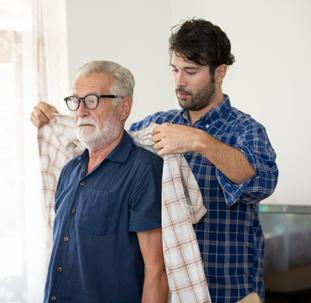
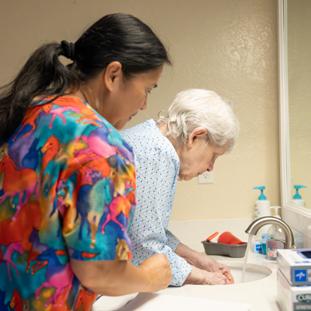


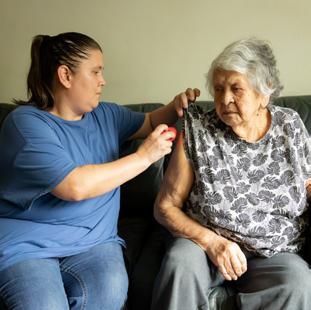


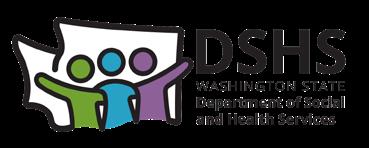
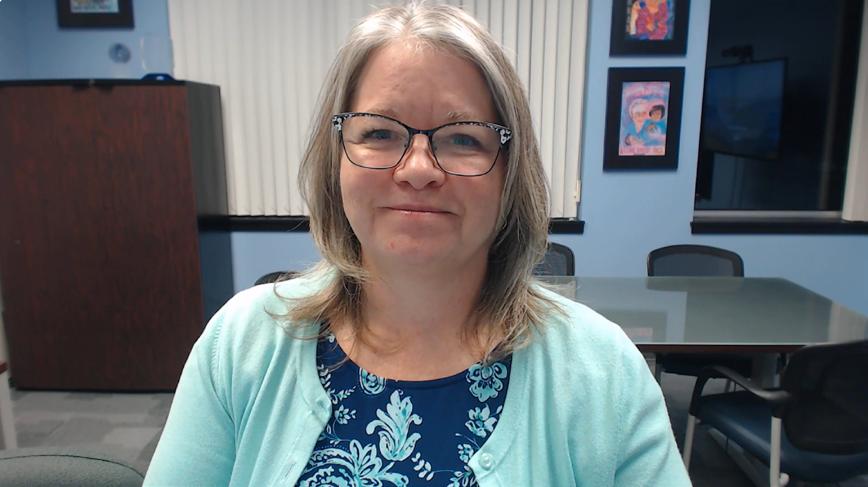

Message from Bea
This message from Bea offers gratitude, recognition, and a look ahead as we continue building a stronger, more inclusive Home and Community Living Administration.
Click to watch Bea's Video
Read Bea’s Transcript (Word format)



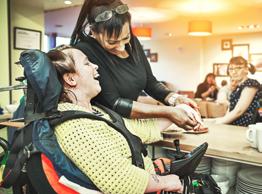












This message from Bea offers gratitude, recognition, and a look ahead as we continue building a stronger, more inclusive Home and Community Living Administration.
Click to watch Bea's Video
Read Bea’s Transcript (Word format)




Each November, National Caregiver Appreciation Month gives us a significant opportunity to recognize the individuals who support older adults and adults with disabilities across Washington State. For the Home and Community Living Administration, this month highlights how essential caregivers are to the health, safety, and dignity of the people we serve.
Caregivers, whether family members, friends, neighbors, or professionals, are often the steady presence that helps people remain connected to their communities and live safely at home. Their compassion and commitment allow individuals to maintain independence and a sense of belonging.
Caregivers also play a critical role in keeping vulnerable adults safe from harm. Because they spend consistent time with the people they support, caregivers are often the first to notice changes in mood, unexplained injuries, or signs of neglect. When concerns arise, their willingness to report suspected abuse or exploitation can be life changing. According to the National Institute on Aging, failing to act when someone is at risk can qualify as neglect or abuse. Reporting concerns promptly can prevent further harm and connect people to needed resources.
Caregiving can also bring emotional stress, physical fatigue, and financial strain. That is why it is vital to support caregivers through education, respite, and recognition.
This month, I encourage everyone to thank a caregiver, listen to their story, or offer support. Your acknowledgment reminds them that their work matters deeply.
To all caregivers: we see you, we value you, and we thank you.
No one is born knowing how to take care of a person getting older, experiencing dementia or living with a disability. There is a free online tool available for all unpaid family caregivers in Washington that can help!
It’s called the Washington Family Caregiver Learning Portal. Resources include informational articles, videos, tip sheets, webinars, online chat rooms and support groups. You can learn about safety and injury prevention, behavioral changes in people living with dementia, legal and care
planning, self-care and more.
Using this online tool can help family caregivers reduce stress, find local resources and provide more informed care for loved ones. All you need is internet access and a laptop, tablet or smart phone. Check it out at wacaregivingjourney.com to get the information you need to better serve your family and yourself.

November is Long-Term Care Awareness Month which was founded in 2001 by the American Association for Long-Term Care Insurance. It was intended to shed light on the importance of preparing for assistance when we are no longer able to care for ourselves or experience a life-changing disability.
According to the LongTermCare.gov website most of us will need some type of long-term care service in our lifetime:
• People who are turning 65 today have a 70% chance of needing some type of care
• Women need care longer (3.7 year) than men (2.2 years)
• About one-third of today’s 65-year-olds may never need long-term care support, but 20% will need it for longer than 5 years.
What type of care would we need as we age? Long-term care services can involve medical and nonmedical care, such as bathing, dressing, preparing meals, and assistance using the bathroom are a few examples. These services can be provided in the home setting (most cases) and other facilities (nursing facilities, assisted living, and other care facility types).
What are some activities to consider in observance of Long-Term Care Awareness Month?
1. Education: Learn about ways you can prepare yourself and loved ones. Make a list of questions or concerns you anticipate that you or your loved one may need and explore online resources.
2. Caregiver Appreciation: Take the time to get to know caregivers by talking with them and thanking them for the work they do.
3. Community Involvement: Visit a local nursing home, assisted living or other facility care type. Participate in fundraising or support local causes for long-term care facilities.
According to AARP, long-term care service planning should happen before retirement. While aging is inevitable and a normal part of life, careful planning and preparation can set us up for success in our later years.

Part of living a full and meaningful life is letting go of what no longer serves us. Here are 5 simple and powerful ways you can practice growing this skill for a life that is happier, healthier, more joyful, spontaneous, and peaceful.
1. Let go of the need to control every outcome
Much of the stress we experience comes from trying to make everything turn out a certain way. But regardless of our planning (and worrying), life has its own rhythm. Instead of obsessing over what you can’t control, focus on what you can: your mindset and your reactions.
2. Let go of grudges
Forgiveness isn’t about others it’s about freeing yourself from carrying pain. Instead of replaying a painful memory, try to acknowledge what happened, accept that you cannot change the past, and choose peace over bitterness.
3. Let go of your ego’s need for validation
Chasing external validation is exhausting and leaves us feeling “less than”. Real confidence doesn’t come from others thinking highly of you. It comes from accepting yourself as you are: imperfect, evolving, and human.
4. Let go of over-thinking
Next time your mind starts spiraling, pause, breathe deeply and ask yourself if your thoughts are helping or harming you. Then ground yourself by connecting to your senses. Being fully present helps you stop the spin-cycle.
5. Let go of perfectionism
Perfect doesn’t exist. When you shift your thinking from life as a performance to life as a practice, you free yourself from self-criticism to live with authenticity, joy, and peace.
When you practice letting go, you begin to shift from trying to control that which you cannot to gaining perspective, peace, creativity, and connection. You remove layers of fear and resistance and open yourself up to the joy of living your best life, which is essential for your wellbeing. Together, let’s remind each other to let go to grow.
After years of hard work, dedication, and relentless problem solving, we have reached a major milestone; the DSHS WA Cares system builds are officially complete. This includes:
• IT systems integrated with the Employment Security Department and Health Care Authority;
• The WA Cares online account system that applicants, beneficiaries and authorized users use to create their online account, apply and manage their benefit; and the Customer Relationship Management tool that DSHS and AAA staff will use to support people in their WA Cares journey;
• The WA Cares assessment tool, the system used by WA Cares team members to complete the care needs assessment and determine functional eligibility; and
• The Interactive Voice Response system, which allows for both English and Spanish listeners to interact and self-serve to learn their application status, benefit balance and act on preauthorizations

This work paves the way for Washingtonians to create their online WA Cares account and, when they have care needs, apply to use their WA Cares benefits. The WA Cares online account is an easy-to-use system that was shaped by multiple rounds of user experience testing. Applicants, beneficiaries and authorized users will use their WA Cares online account to apply and manage their benefit.
You can create your online account starting in April 2026, apply for benefits starting in mid-May and use your benefits in July. “This milestone belongs to the entire WA Cares team,” said Ben Veghte, WA Cares Fund Director. “Thank you for your persistence, creativity, and commitment throughout this journey. It’s a big deal, and I hope you feel the same pride I feel when you think of how far we’ve come. Congratulations on this impressive success –and onward to testing and toward launch!”
Watch our webinar recordings, follow us on Facebook, LinkedIn and Instagram or subscribe to our newsletter for updates.
The next phase is to finish validating everything we’ve built, ensure quality, and prepare for a successful launch. While this is a different kind of work, it is equally critical, and we are ready for it.

Hello HCLA family,
In the short one and half months that I’ve been in HCLA, I’ve had the opportunity to attend all-staff meetings, meeting with our Directors and listen to direct service staff about their lived experiences. I understand there may be uncertainty regarding our Equity, Diversity, Access, and Inclusion efforts moving forward and I want to share that HCLA remains committed to ensuring that our programs and activities are legally compliant as we remain in alignment with the state's vision and efforts to ensure that all Washingtonians have fair access to opportunities and the resources and benefits available to them, and keep advancing a Washington for All.
As recent guidance shared by the Office of Equity states, “Equity initiatives are important to ensuring access to all, to all opportunities, and they are an important proactive component of preventing discrimination. Importantly, Washington state’s legally compliant policies are not discriminatory or so-called “illegal” DEI; we’re innovating ways to better serve everyone who lives in Washington.”
Achieving this goal in our community engagement efforts requires us to identify the barriers that different people and communities face towards fair participation and creating targeted strategies that help all groups access support, care, and resources.
One of those communities is our own HCLA workforce, YOU. I realize that these past few years have presented many changes, challenges, and ongoing uncertainty in our personal and professional lives which can be challenging for us as individuals and an organization to process. As we continue to move forward with our DSHS Reimagining efforts, I hope we can create more spaces to process in community, collect your feedback and engage in person centered conversations about your experiences and provide you with the support to have your voices heard as I want HCLA to be an Administration where you feel a sense of Belonging.
If you have thoughts regarding how we can all co-create Belonging together, my team would love to hear from you. I encourage you to reach out directly to me or a member of our SEA Team and complete the DSHS Employee Engagement Survey so your voice is captured!
Thanh Tran
HCLA’s strategic plan is a comprehensive and bold roadmap of administration priorities, action plans, and success measures designed so that people find human services to shape their own lives. The strategic plan identifies where we currently are with our performance, where we want to be and how we are going to get there. The plan is used to guide our day-to-day efforts and focus our resources. It is a reflection of the work we do every day.
This plan update integrates legacy ALTSA and DDA plans into one collaborative and forward-facing HCLA plan that continues to support CHOICE, ACCESS and INDEPENDENCE for older adults and people with disabilities.
Goal #1: Offer personalized services that help people of all ages choose where and how they receive care.
Goal #2: Uphold and protect client independence, health, safety and rights.
Goal #3: Engage partners to increase access to coordinated services and improve customer experience.
Goal #4: Strengthen the direct care workforce.
Goal #5: Foster a culture of belonging, well-being, and engagement in our shared mission, vision, values and strategic goals.
DSHS’s strategic priorities and comprehensive plans, by Administration, along with the full details of HCLA’s strategic plan can be found here
This living blueprint showcases our decisions and actions that help ensure Washingtonians continue to have access to safe and high-quality services and supports.
These initiatives could not be designed or delivered without HCLA staff who provide training, program development and oversight, quality assurance, and assistance with contracts, information technology, data analysis, facilities management, budget, finance and forecasting. Your creativity and innovation are why Washington is a nationally recognized leader in the delivery of long-term care services.
Why it Matters
>115,000 Seniors and People with Disabilities
$18.2 Billion Budget 25-27 Biennium ~4,300 FTE
78K Direct Care Workers

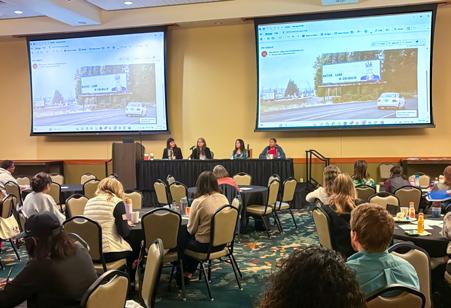

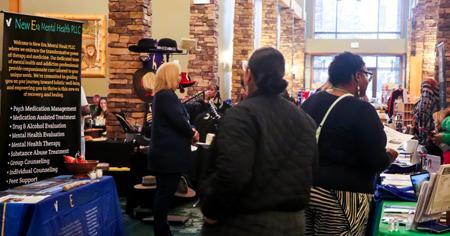
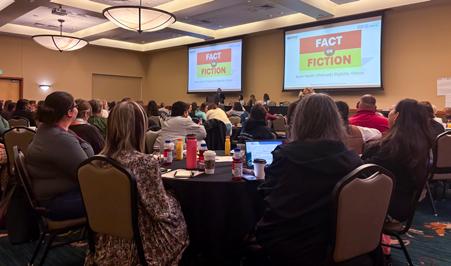
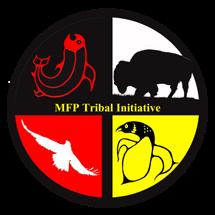
The Money Follows the Person Tribal Initiative Collaborative Summit kicked off on Wednesday, Oct. 22 at the Great Wolf Lodge Conference Center in SW Washington state. Over 150 participants representing the five MFPTI states (Minnesota, North Dakota, Oklahoma, Washington and Wisconsin) convened as Tribal nations and state partners met and worked cohesively to share program insights to strengthen long-term services and supports and home and community-based services that reflect the Tribal nations they serve.
This gathering uplifted tribal voices, honors sovereignty, and ensures Tribal Elders and relatives with disabilities receive care that reflects traditional knowledge along with access to modern care. The relationships built over these three days enable systems of care to be created to meet the healthcare needs of current and future generations. The focus is on designing and delivering care to restore balance, dignity, and choice to the diverse communities we serve.
At the Summit attendees shared success stories, lessons learned and hopes for the future of Tribal long-term programs and services. Breakout sessions dominated both afternoons with a variety of program offerings. Day 1 included tribal case management, Medicaid alternatives, Medicare and dual eligible plans and the Roads to Community Living grant funded program. Day 2 included workshops on CDWA, caregiver recruitment and retention, resource support and development and billing/reimbursement strategies, plus a couple related panel discussions. The final day wrapped up with Elders and cultural leaders sharing their perspectives on incorporating traditional ways with modern care systems and future priorities.
The relationships built over these three days energize the commitment to the journey ahead to create systems of care that honor the past, meet the needs of the present and prepare for future generations.
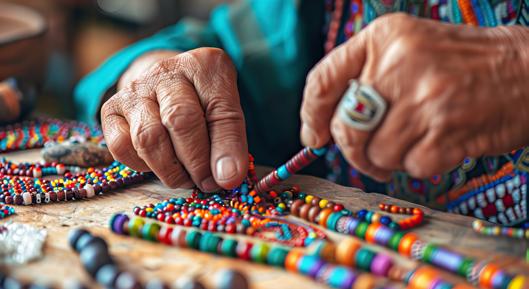
This month is a time to honor the traditions, languages, and stories of Native American and Alaska Native communities. Their cultures and contributions continue to shape our nation and enrich our lives.
For nearly 100 years, people have called for a national way to recognize Indigenous heritage. In 2009, Congress made the Friday after Thanksgiving “Native American Heritage Day.” Today, we celebrate the diversity of Indian Country and honor Native veterans who have served our nation.
In Washington, 29 federally recognized tribes are deeply connected to the land and waters of the Pacific Northwest. From coastal communities like the Makah and Quinault to inland tribes like the Spokane and Colville, each nation brings unique traditions and leadership in areas like education, health, and environmental stewardship.
Native American Heritage Month is also a reminder of tribal sovereignty and the importance of respectful partnership.
Learn more about Washington’s tribes and their work:
• Washington Tribes – The Tribes of Washington
• Washington for All – Tribal and Indigenous Communities
• Washington State Historical Society – This Is Native Land
There is a significant gap between high school sign language programs such as Career and Technical Education, College in High School, and Running Start and the next steps including community colleges, a four-year Interpreter Training Program, and structured post-graduation mentorship. Closing this gap is essential to inspire high school ASL students and college students, while also addressing the shortage of qualified sign language, trilingual, and protactile interpreters in Washington. The Plan:
1. Map the pathway from high school to post college.
2. Identify gaps in accessibility, training opportunities, and mentorship.
3. Connect with high school and college ASL teachers, CTE directors, CiHS coordinators, school administrators, and OSPI to gather feedback.
4. Collaborate with educators, agencies, Deaf leaders including DeafBlind and People of Color, and state partners.
5. Engage ODHH as a primary state partner and TERPWA as a professional interpreter organization so both can serve as peer reviewers.
6. Develop a pathway proposal with recommendations for legislative funding for a four-year Interpreter Training Program followed by a mentorship program. This project will be framed as a community-based scholarship for Central Washington University. It will strengthen interpreter preparation, build cultural competency, and help ensure the Deaf community has consistent access to qualified interpreters.
If you know any of these folks, please take a moment to send them a RAVE review which will be cc’d to their supervisor! Or send them a Teams message to thank them for their service. Either way, peer recognition matters, and is one more way we all contribute to HCLA being the culture we want it to be and our Employer of Choice!
35 Years
Janice A Castillo
30 Years
Prentice D Stephens
25 Years
Lori Christine G Bare
Patience J Jones
Natalie McLaughlin
Teresa A O Donnell
Lance R Rickman
20 Years
Allison Krista Facio Garza
Kristine N Pederson
15 Years
Michelle Rae Closner
Wing Sum Kwong
Ryan J McGrath
Robin L Reynolds
10 Years
Renee Marie Chenvert
Karen Lenore Conard
Lauren Bryn Fabella
Rebecca Sue Fife
Teri Germann
Gia Marie Gordon
Hayward Ray Hall Jr
Laurie Ann Jimenez
Veana Ta-Dae Johnson
Marcie L Lee
Michelle A Ludwick
Scotti D Miller
Maleia Ann Press
Robin L Priebe
Marlo Marie Slagle
Amie M Starr
Jamie N Tong
Denetta M Uzzell
Leslie Marie Watts
5 Years
Autumn Kathleen Alarcon
Brianna Allyson Arboine
Nicole Marie Billings
Nicholette Ann Flynn
Holly George
Rebecca Hjaltalin
Danielle Christine Iardella
Olivia Luna
Michelle D McGlon
Sarah R Miller
Tracy Lynn Ramirez
Tiffanie C Rook
Ay'sha Singleton
Samantha L Smith
Jenna Veronica Vandermeer
Kaitlin Kemp Walker
Amanda Edgar
Amanda Edgar and her team worked with a very challenging client who was obviously in needed immediate assistance to ensure his safety. They completed a same day assessment, got quick financial approval, found a facility willing to take him in a very short period of time and made referrals to supportive services when they recognized the urgent nature of his situation.
- Trisha Armenta
Justin Grieve
Justin successfully extinguished a fire that ignited during a client interview. The elderly residents of the home were unaware of the smoke due to the absence of smoke detectors, but Justin acted swiftly to contain the flames before any harm could occur. We extend our gratitude to Justin for his prompt and effective response.
- Lorena Swift
Take time to appreciate others by sending them a RAVE Review! Bookmark the link! It’s so easy and can really impact a sense of connection and belonging for both the sender and receiver!
Ashley Ramirez
Shout out to APS Investigator, Ashley Ramirez! She is an amazing team player. Not only does she excel at her own investigative work, but she also goes above and beyond to support her coworkers. She reaches out on her own and asks if there are any tough cases she can assist with, and she has a knack for acquiring information when I am having a difficult time acquiring it. She is one of the best coworkers around and I am very lucky to learn from her. Cheers to Ashley.
-Geoffrey Garrison
Heidi Wolff
Heidi assisted my team with interviewing an individual who appeared protective and was not forthright with information. I asked Heidi if she could assist due to her kindness, respectfulness, and superb rapport building skills. Sure enough, Heidi was successful in earning the individual's trust and was able to obtain accurate information to help my team locate an individual that we could not find. My team, and myself, were very impressed.
-Kyle Pentecost
Christina Garvin
Christina has been a pillar of the intake team, consistently bringing expertise, dedication, and heart to every interaction. Her deep understanding of the programs we offer, combined with a steadfast commitment to service, has empowered countless Washingtonians to access vital support during times of transition and crisis. Christina approaches each conversation with empathy and professionalism, listening with compassion and responding with care. Her presence elevates our work and exemplifies the values we strive to uphold So appreciate her contribution to the team.
-Chris Cornell
Focal Point trainings are a continuous learning experience provided by HCLA staff for HCLA staff. All division employees are encouraged to participate in any of the available offerings. Schedule can be found at: Focal Point Training Topics or Focal Point SharePoint site

Monthly Newsletter
Highlights relevant articles, training, and connection opportunities for everyone.
Click to Read
HCLA Organizational Development SharePoint
HCLA Wellness note highlights a different dimension of well-being and provides a one-page resource. November's topic is “Meaning”
Open Wellness Note


Human Resources SharePoint




Microsoft Word Instructions
Checklist
PowerPoint Microsoft Guide
DSHS Checklist
Adobe Acrobat Oviewview
Working with Tags
ALT Text Resources: Screen Readers and Alt Text
Section508.gov
Quick Links:
Accessibility Resources
Plain Language Policy
DSHS Templates
DSHS Logos
Word Style Guide
Plain Language Training: Now Available
Your voice is critical in the reimagining process. Please share your questions and offer feedback by contacting us at Reimagine@dshs.wa.gov.
Share your idea by completing the Reimagine DSHS Idea form.
Visit the Reimagine DSHS SharePoint Page
You can donate your leave to a coworker in need. Visit Shared Leave site.
EAP offers confidential support and tools to help you navigate personal or work-related challenges during uncertain times. Learn more at www.eap.wa.gov or 877-313-4455.
If you have:
• Over 80 hours of Annual Leave.
• Over 176 hours of Sick Leave.
• A Personal Holiday available.